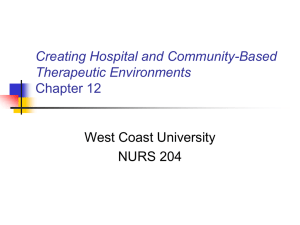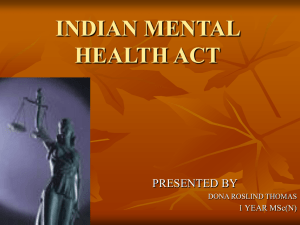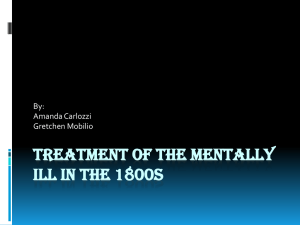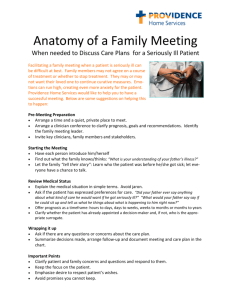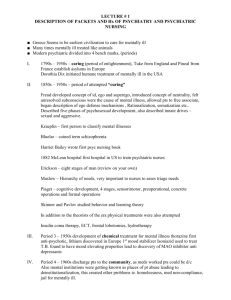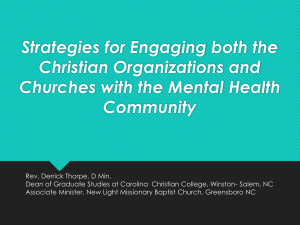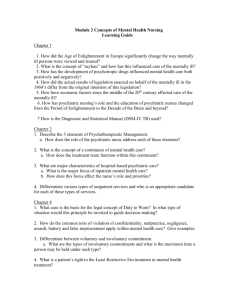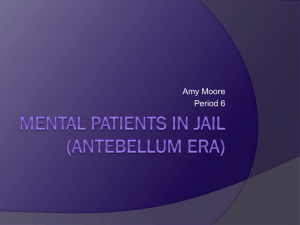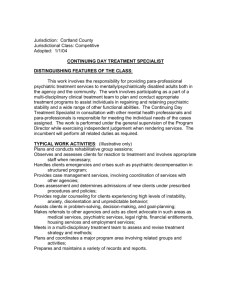Overwhelmed local mental health systems
advertisement
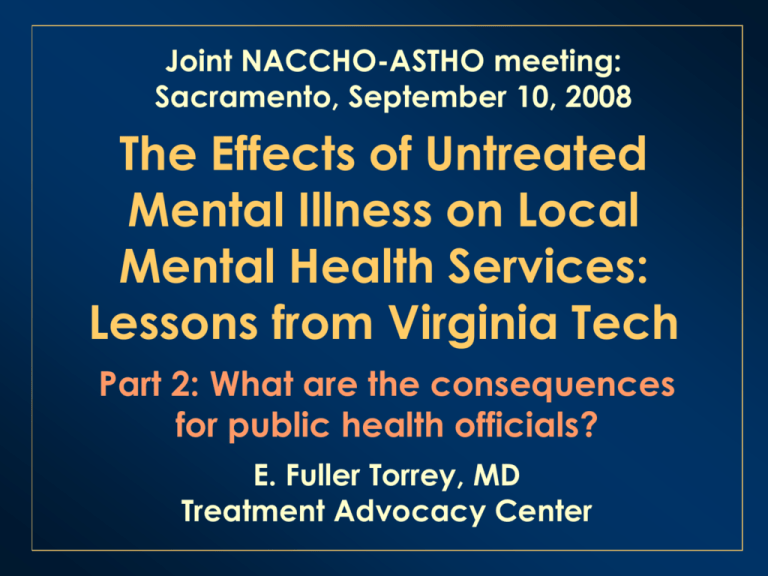
Joint NACCHO-ASTHO meeting: Sacramento, September 10, 2008 The Effects of Untreated Mental Illness on Local Mental Health Services: Lessons from Virginia Tech Part 2: What are the consequences for public health officials? E. Fuller Torrey, MD Treatment Advocacy Center The Virginia Tech tragedy is an example of a much larger problem. What is the magnitude of the problem? • There are approx 4 million people in the U.S. with serious mental illness (SMI). • SMI includes schizophrenia, schizoaffective disorder, and bipolar disorder. Among these 4 million seriously mentally ill individuals: • At any given time, half are receiving no treatment for their illness. • 10% are problematic (homeless; in jail or prison). • 1% are overtly dangerous (violence against others, including homicides). Source of these data: Also the website of the Treatment Advocacy Center, www.treatmentadvocacycenter.org What is the magnitude of the problem? There are 4 million seriously mentally ill individuals in the U.S. (population 302 million) Therefore: Per 1,000 pop Per million pop Number of seriously mentally ill individuals 13 13,000 Number of seriously mentally ill individuals who are problematic (10%) 1.3 1,300 Number of seriously mentally ill individuals who are dangerous (1%) 0.13 130 What does this translate to? New River Health District, Va. (pop 175,000) Sacramento County (pop 1.4 million) State of California (pop 36.5 million) 2,275 18,200 474,500 Number of seriously mentally ill individuals who are problematic (10%) 227 1,820 47,450 Number of seriously mentally ill individuals who are dangerous (1%) 22 182 4,745 Number of seriously mentally ill individuals Why should you be concerned? • Major cause of homelessness • Major cause of overcrowding of jails and prisons • Major problem for police and sheriffs • Major cause of violence and 10% of homicides • Major problem for local ERs • Impairs community quality of life, e.g., public parks, public libraries • Major expense for counties and states (court costs; jails and prisons; lawsuits) Homelessness • A 2005 survey of the U.S. estimated that there were 744,000 homeless people; 439,000 of them were single individuals, and the rest were part of families. • Multiple studies have reported that at least one-third of single homeless people have severe psychiatric disorders. Thus, there are between 150,000 and 200,000 homeless individuals with severe psychiatric disorders. This is equivalent to the population of Des Moines, Providence, or Salt Lake City. Homelessness, cont’d. • In Massachusetts, 27% of patients discharged from a state hospital became homeless within 6 months. In a similar study in Ohio, the figure was 36%. • A study of homeless mentally ill individuals reported that 28% of them got some of their food from garbage cans, and 8% used garbage cans as their primary source of food. Jails and Prisons • Approximately 10% of the nation’s 2.2 million jail and prison inmatesor 220,000 individualshave severe psychiatric disorders. • These 220,000 individuals are equivalent to the population of Akron, Madison, Richmond, or Tacoma. • The Los Angeles County Jail, Chicago’s Cook County Jail, and New York’s Rikers Island Jail are, de facto, the nation’s three largest “psychiatric hospitals.” Jails and prisons, cont’d. • In every county in the United States, the county jail holds more severely mentally ill individuals than the psychiatric unit of the county hospital. Police and Sheriffs The outcomes of confrontations between police and mentally ill individuals are often tragic. In Ventura County, Calif., mentally ill individuals were the victims of more than half (18/32) of all justifiable homicides by police during a 10-year period. The number of police and sheriffs officers killed by mentally ill individuals has increased sharply in recent years. Violence and Homicides • Studies from Albany County, NY; Contra Costa County, Calif.; and Indiana suggest that individuals with serious mental illnesses commit approx 10 percent of all homicides in the U.S. • In 2006, there were 17,034 reported homicides in the U.S. • Therefore, approx 1,700 of these homicides were caused by individuals with serious mental illnesses. Emergency Room Crowding “Psychiatric patients, including children, routinely ‘boarded’ in emergency departments” June 2008 study of the American College of Emergency Physicians Quality of Life in Community Recent survey of 300 public libraries: • 28% reported assaults on staff by seriously mentally ill patrons • 85% reported having to call the police for such individuals • 92% reported that such individuals disturb other patrons Major expense • Mentally ill inmates in jails cost 60% more than non-mentally ill inmates • Costs of antipsychotic medication • Lawsuits, e.g., a county in Wisconsin was successfully sued for $5.4 million Solutions • The problems are associated with: • A small subset of seriously mentally ill individuals • Who are not being treated • Therefore: • Identify the subset • Make sure they get treatment Identification of Target Population • Past history of violence • Substance abuse • Medication noncompliance and anosognosia Leveraged treatment • Representative payee • Access to housing • Mental health courts • Conditional release • Assisted outpatient treatment (AOT or Kendra’s Law) Effectiveness of Assisted Outpatient Treatment 1. Decrease in days hospitalized per year Prior to being on AOT On AOT Decrease District of Columbia 55 38 -31% North Carolina 22 14 -36% Ohio 133 44 -67% Iowa 33 5 -85% New York 100 44 -66% North Carolina 33 5 -85% Effectiveness of Assisted Outpatient Treatment, cont’d 2. Decrease in homelessness: 19% to 5% (NY) 3. Decrease in victimization: 42% to 24% (NC) 4. Decrease in arrests: 45% to 12% (NC) 30% to 5% (NY) 5. Decrease in violent behavior: 42% to 27% (NC) 15% to 8% (NY) Methods for guaranteeing that individuals take medication • Directly observed therapy (DOT) • Long-acting injection • Implantable medication devices • Assays of blood or urine Make assisted outpatient treatment available in all states. The following states do not now have it: Maine Massachusetts Connecticut New Jersey Maryland Tennessee New Mexico Nevada An important resource Treatment Advocacy Center Arlington, Va. www.treatmentadvocacycenter.org The paramount civil right of the patient should be that of adequate treatment. Stephen Rachlin, 1974 Acknowledge kind help of NACCHO: Robert Pestronk Patrick Libbey Francienne Saucedo Corey Siembieda Jack Herrmann Kate Peterson
